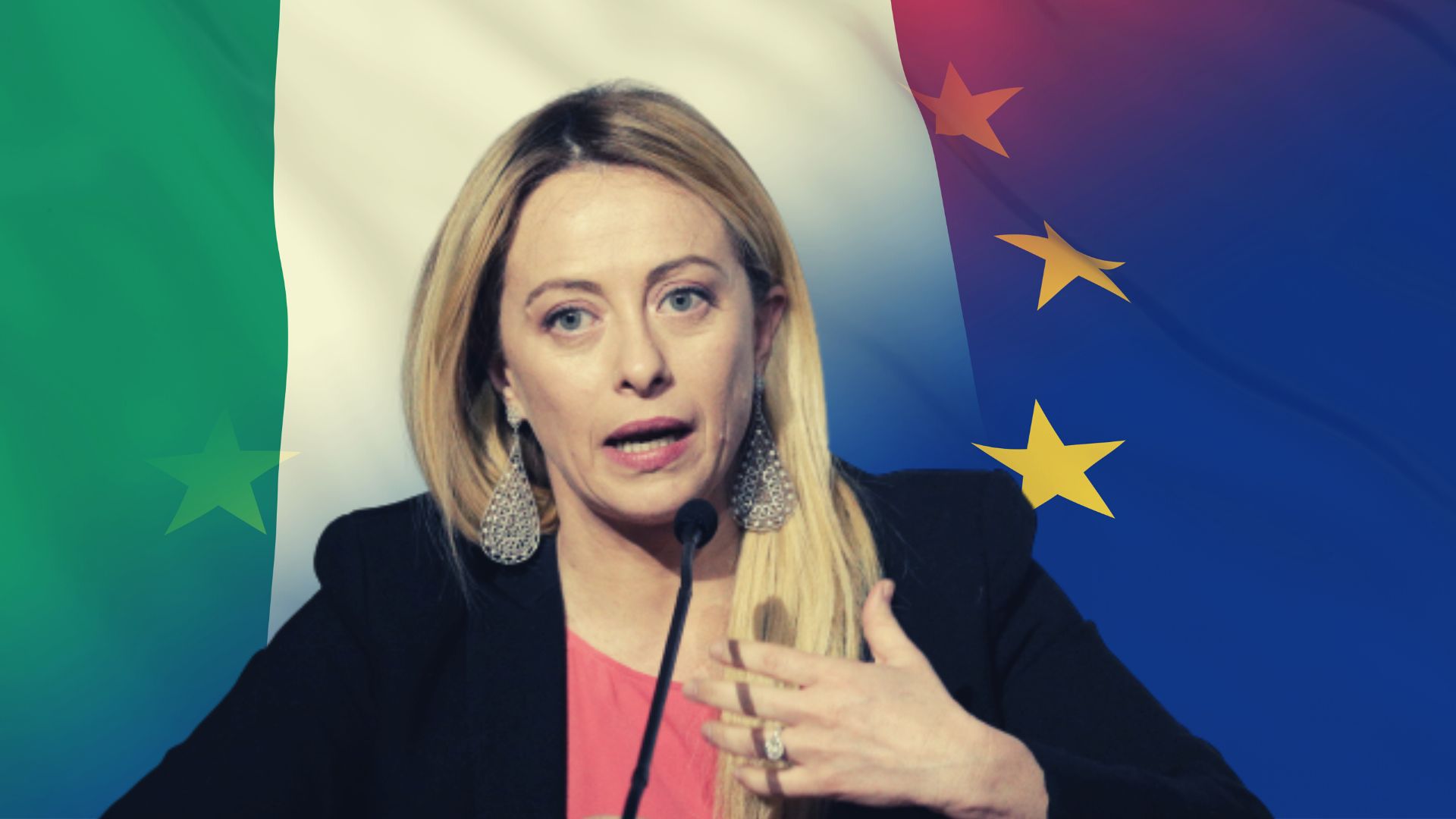With Giorgia Meloni almost certain to become Italy’s next prime minister, the question is whether her victory can turn the tide of history against the EU establishment.
Meloni has long been an ally of Hungarian Prime Minister Viktor Orbán, with the two seeing eye to eye on a range of issues such as mass migration and traditional values. As a nation, Hungary currently embodies the most pronounced rejection of the EU’s dominant left-liberal establishment and its ideology, which is why that establishment has made it a priority to remove Orbán’s government and replace it with a more accommodating one. Italy suddenly standing in the corner of Hungary has huge geopolitical implications, and at least for the moment, she may stand in the way of the EU’s long-term goal of a federal superstate based around open borders, progressivism, and multiculturalism.
As Remix News has reported on extensively, the EU is moving forward with plans to punish Hungary with €7.5 billion in funding cuts; however, with the new government in Rome, it will likely be much harder for Brussels to punish Hungary in such a flagrant manner. Sweden’s new conservative government may also be more willing to go out on a limb for Hungary if Italy, the EU’s third-largest economy and one of the founding members of the bloc, protests the move as well. And many smaller countries, not necessarily aligned with Hungary but concerned about their sovereignty in a Europe dominated by France and Germany, may also in turn take a stand against sanctions.
In effect, Hungary, and the vision of Europe it represents, which is a Europe of nations, is experiencing a resurgence. Furthermore, Italy has a direct interest in defending Hungary. Right before the Italian election, European Commission President Ursula von der Leyen warned Italy that if the “wrong” parties came to power, the EU had “tools” to deal with the problem.
“We will see the result of the vote in Italy,” said von der Leyen. “If things go in a difficult direction — and I’ve spoken about Hungary and Poland — we have the tools.”
Based on the threat from the European Commission president, Italy, along with any other government wary of an EU with nearly unlimited power, may see themselves as next on the chopping block if Hungary is punished first.
Despite von der Leyen’s claims, Italy is a net contributor to the EU budget, and it will not be so easy to bully conservatives in the country, especially with euroskepticism already on the rise amongst the Italian public.
No absolute majority government
Nevertheless, Meloni does face some serious challenges. The reality for conservatives is that the victory in Italy is perhaps one of the most substantial victories in the last decades, but it is built on a shaky foundation. For one, Meloni does not have an absolute majority that could enable her to make constitutional changes, which is a major difference from Hungary, where Orbán has long enjoyed a two-thirds majority that has not only enabled constitutional changes but also allowed him to govern without the constant threat of his coalition dissolving. Meloni’s lack of a strong majority presents a serious impediment to wielding the power she needs to truly affect the status quo. However, it should also not be forgotten that in Italy it is possible to make constitutional changes through referendum, which remains a possible yet remote option for the conservative government.
The only sure thing in Italian politics are snap elections and volatile governments
The second problem facing conservatives is that Italian governments are notoriously susceptible to sudden and abrupt disintegration, with the country hosting 63 governments over the last 70 years, meaning each government did not last much more than a year on average. Meloni has a distinct advantage over the government that fell apart in 2018 after League party leader Matteo Salvini called for snap elections while serving as interior minister, a move that turned out to be a severe strategic mistake for Salvini. Meloni’s government will instead consist entirely of center-right and nationalist parties, which puts it on a far more stable footing.
However, there are already signs of some division.
Reportedly, Meloni does not want to reappoint Salvini as interior minister due to the international backlash her government might face. Even if these claims are untrue, Salvini’s party is undoubtedly in the weaker position in the coalition after securing under 9 percent of the vote, a dramatic fall in support that could even put Salvini’s role as party leader in jeopardy. Although Salvini’s ego may be bruised, the fact that both he and Meloni campaigned together and share some ideological views may help ensure the stability of their alliance. Meloni should do her best to make sure Salvini and his party do not feel marginalized.
[pp id=16171]
Silvio Berlusconi, the leader of Forza Italia, is more of a wild card. A week before the election, he said that Putin was forced to invade Ukraine only to remove Ukraine’s President Volodymyr Zelensky from office and install “a government with decent people” in Kyiv. Both Berlusconi and Salvini are more supportive of Russia and have cautiously made statements that appear to support ending sanctions, whereas Meloni has stated that she intends to support Ukraine and continue backing EU sanctions. Ultimately, sanctions on Russia are just one of many contentious topics, and it is generally unclear in which direction Berlusconi will take his party under the new government.
EU holds the financial purse strings
The third challenge for Meloni is Italy’s massive debt problem. Italy has one of the highest debt loads of any country, with debt standing at 151 percent of GDP. Although Italy is a net contributor to the EU, the EU also has Italy in a recovery program worth €19 billion, or 1 percent of GDP, with that money dependent on the government continuing to introduce painful reforms to the Italian economy. While the Brothers of Italy said that it wants to reform the aid program, the EU is demanding Rome meets 55 new targets to receive the next tranche of funds in December. Brussels said that some “fine-tuning” of the agreement may be possible.
If Meloni, who has said in the past that she wants to defend Italy from “nihilistic globalist elites, driven by international finance,” is willing to engage in some risky brinkmanship, she may be able to leverage the shaky situation with the euro currency, the entire bloc’s deteriorating economic outlook, and Italian citizens’ anger to force more financial concessions from Brussels. But at the same time, the EU establishment may have little incentive to help a government they view as hostile to their political power.
Although Italy’s current economic woes cannot be blamed on the new government, it is most certainly going to inherit them for the foreseeable future, in addition to a burgeoning energy and inflation crisis that is threatening upheaval across Europe.
[pp id=10086]
In an interview with Germany’s Taggeschau newspaper, political expert Prof. Andrea De Petris, who works at the Center for European Politics, outlined the difficult situation Meloni finds herself in, saying that “Meloni knows very well: Economically, Italy is very dependent on European funds. These will only continue to flow if certain reforms initiated by the Draghi government are continued. That’s why I personally don’t expect such a big difference in relation to the EU. Otherwise, she must prepare herself and Italy for the fact that the European Union will react in the same way as with Hungary and Poland. But that is clear to many here.”
Although De Petris belongs to an organization hostile to Meloni, labeling her as the “extreme right,” Italy’s difficult economic situation cannot be denied. When von der Leyen speaks of “tools,” she does not necessarily even need to cut EU funds over rule of law issues, as seen with Hungary. Instead, the EU can harshly enforce austerity programs and, in turn, stifle attempts for Meloni to enact some of her costly campaign promises, such as introducing free daycare to support family formation.
Italy’s pro-EU president
The fourth problem the new government faces is President Sergio Mattarella. Newly elected to a seven-year term, Mattarella is most certainly in bed with the most technocratic and left-liberal elements of the EU. He has the power to reject ministerial candidates, veto legislation, and cause other forms of havoc for the new government. He also happens to be the commander and chief of the Italian armed forces.
The Brothers of Italy party has indicated that one of its key policy goals is to make the post of president open to a vote by the general public, as currently only parliament votes the president into power, but that is a move that would require constitutional reform. As already noted, the new government has only a long-shot chance of reform in this area, but if achieved, it would result in a major blow to the left-liberal establishment’s efforts to contain the new government.
Meloni may be a true believer who is willing to put her neck on the line to save her country, but she will have to use her wits and build alliances in Europe to withstand the “brutal” response expected from an EU fearful of Europe’s rising populist-conservative movement. Despite these challenges for Italy’s new government, the outlook is measurably brighter for European conservatives than just a few months ago. The more European governments head in the direction of Sweden, Italy, and Hungary, the more likely the EU’s left-liberals will be unable to force their will on European nation-states and fulfil their dream of creating a European superstate.






